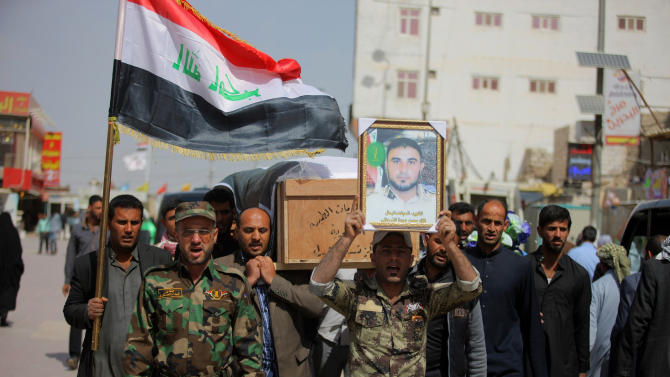Iraqi soldiers and Shiite militiamen captured a town Tuesday on the outskirts of the Islamic State-held city of Tikrit, sealing off Saddam Hussein’s hometown in preparation to confront the extremists in one of their biggest strongholds, officials said.
Iraqi forces entered Alam early Tuesday morning, their armored convoys roaring past the empty arid fields and occasional palm tree before gaining full control hours later, two Iraqi officials said. By nightfall, the military sealed off Tikrit on all sides, the officials said, speaking on condition of anonymity because they were not authorized to talk to journalists.
Tikrit, the capital of Salahuddin province, lies about 130 kilometers (80 miles) north of Baghdad. Sniper fire and roadside bombs initially hampered the advance into Alam, said Ahmed al-Karim, the Salahuddin provincial council chief. Extremists also blew up the Alam bridge to slow the Iraqi force, military officials said.
After seizing Alam, Shiite militiamen held assault rifles over their heads, chanting that the Islamic State group was “unable to conquer us.” Their involvement has been key in the Iraqi offensive, as have the involvement of Iranian military advisers guiding them.

Among those directing operations is Iranian Gen. Qassem Soleimani, commander of the powerful Revolutionary Guard’s Quds Force. The overt Iranian role and the prominence of Shiite militias in the campaign have raised fears of possible sectarian cleansing should Tikrit, an overwhelmingly Sunni city, fall to the government troops.Most battlefield successes in Iraq have been coordinated efforts, with Iraqi and Kurdish forces and Shiite militias fighting on the ground and the U.S.-led coalition providing air power. The siege of the village of Amirli just north of Baghdad, when many feared the capital itself might fall, was broken last year with the help of U.S.-led airstrikes and a fighting force of mainly Shiite militias. Shiite militiamen backed by a coalition air campaign also retook the town of Jurf al-Sukhr, on Baghdad’s outskirts, from the militants in October.
Soleimani was a key player in both of those campaigns. But Iraqi and Kurdish officials and Shiite militia fighters all acknowledge the crucial role the coalition airstrikes played in their modest victories. And so far, the U.S. has said it isn’t coordinating with Iran on its strikes and hasn’t been asked to provide aerial support in the Tikrit offensive.
The Islamic State group holds a third of Iraq and neighboring Syria in its self-declared caliphate. In Syria, activists said Tuesday that more than 70 prisoners escaped from an Islamic State jail in the northern town of Al-Bab, with militants searching for those who fled.
The prisoners took the opportunity to escape when clashes erupted between rival militant groups, said Bari Abdelatif, an activist from al-Bab who is now based in Turkey.
“There are checkpoints everywhere,” Abdelatif said of the town. He also said militants drove through the town’s streets, calling on people over loudspeakers to hand over any hiding prisoners.
The Britain-based Syrian Observatory for Human Rights and Abdelatif said those who fled included Kurdish fighters captured by the Islamic State group in recent months. The Observatory said the extremists were able to recapture some of those who fled but did not provide details or numbers.
In recent months, the Islamic State group has been defeated in some areas, including the Syrian border town of Kobani and several surrounding villages.
U.S. military officials have that said a coordinated military mission to retake Mosul, Iraq’s second-largest city, likely will begin in April or May and involve up to 25,000 Iraqi troops. But the Americans have cautioned that if the Iraqis are not ready, the offensive could be delayed.
Tikrit is one of the largest cities held by Islamic State militants and lies on the road connecting Baghdad to Mosul. Retaking it will help Iraqi forces have a major supply link for any future operation to retake Mosul.
Gen. Martin Dempsey, chairman of the U.S. Joint Chiefs of Staff, has emphasized on the importance of sustaining the anti-Islamic State coalition for the longer term. Shiite dominance in Baghdad has upset predominantly Sunni countries like Saudi Arabia and the United Arab Emirates, as well as Iraq’s own Sunni heartland, leading some to support the extremists. Former members of Iraq’s outlawed Baath party, loyalists to Saddam, also joined the Islamic State group during its offensive.
___
Associated Press writer Bassem Mroue in Beirut contributed to this report.































